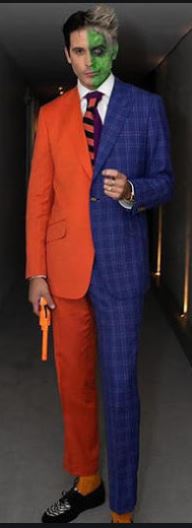Guise/Disguise

As far as I could see, many people created an image of themselves that usually proved to be better than they actually were. They tried to live up to it, needing to convince others that their façade was the real thing.
Forty years ago, when a distant relative, Julian, had an amicable divorce, his kind wife told him she didn’t want a financial settlement. However, she desired one thing: for him to commit to becoming a worthy person, whatever form that might take. He seemed to take her wish to heart. Previously, he’d only desired to be snookered on alcohol or high on drugs. A fortunate ancestor on that side of the family (not my side) left him enough money to live on, so he had no need to develop a career. Post-divorce, Julian tried a variety of personas: artist, professional skier, cowboy. Although he loved drawing abstract pencil and ink designs, taking his three horses on pack trips and speeding down the most difficult Black Diamond slopes, he told me he wanted people to know he had more to offer the world than his artistic or athletic abilities.
One day, he announced his decision at a family gathering. With joy and pride, he declared his latest, final identity: a businessman/golfer. I enjoyed his pleasure, but remained unclear as to the nature of his business, other than talking to a stock broker quarterly. And he continued to be just as drunk/high as before. Happily, he seemed more confident, as if the fact that he told people about his new identity meant that they accepted him as such. He explained to me how good he felt to have fulfilled his ex-wife’s desire. Julian provided me with my first clear example of someone who deliberately manufactured a self-image.
I’ve known many people who chose the party lifestyle with its mind-bending alcohol and drugs: my parents, other family members and friends. From what I observed, they seemed to find inebriation satisfying, a fact I’ve never understood. In my early years, I experimented with alcohol and marijuana, but hated feeling stupid and slow. As I’ve observed people through the decades, I’ve accepted that others enjoy being high, so much so, the party persona loomed as dominant. Other, more true and valuable parts of them became subsumed into the all-encompassing god, Dionysus. Mom had considerable abilities as a special education teacher, but she valued her party girl persona above all and presented that side of herself to the outside world. An artist I knew well allowed her sophisticated abstract paintings to take a back seat to her bouts of daily drinking.
Disliking intoxication, I seemed to be a minority among many of Earth’s species, no doubt, a result of a mutant gene. When a neighbor’s bright red berries fermented each fall, all the neighborhood dogs, cats and birds gobbled the over-ripe fruit. In Dionysian frenzy, they got drunk, staggered about, and vomited everywhere. I felt Nature made me a sober oddity.
Like Julian, a lot of people built an identity based on their jobs, which seemed sensible. However, I’ve noticed that some people rated their jobs as superior to all others and adopted a grand persona. A woman in my neighborhood bragged about her job as a “profiler,” which remained a mystery to me. She frequently reminded me of her importance, puffing herself up into a more majestic size, head thrown back, shoulders raised, chest high. She often flaunted her greater knowledge and salary. I never grasped what she actually did.
I’ve seen these self-important types from medicine to ministry to artists to computer programmers. Convincing others of one’s superiority seemed to become an art form for some, a consuming passion, no matter what the field of endeavor. I’ve analyzed their methods and strived to learn them, but never mastered the techniques. The most common ways I’ve seen people self-inflate are:
- SELF-DECLARATION One self-declares, “I’m so good at/crazy about my work, I routinely stay up all night for three nights in a row. I can’t help myself.” I’ve done that lots of times, but never claimed the chutzpah to proclaim it abroad.
- SHE’S A GENIUS A close friend or colleague loudly and repeatedly announces the person we both know is a genius at what she does. Having another person vouch for her adds a considerable amount to her status. How does a person obtain an enthusiastic promoter of this sort? I’ve never solved this mystery.
- OBSESSION A person tells others he’s obsessed with his work because he produced 2,000 pages of X. This is seen as a sign of extreme competence.
- SELF-PROMOTER Someone routinely announces he knows more about X than anyone else. Repeated enough times, amazingly, people start to believe him.
- AWARD WINNER Listing awards won, articles published or famous people who endorse someone convinces others of a person’s high credibility. I usually forget to do this.
- “I’M IMPORTANT” CLOTHING Wearing special clothes can indicate high standing, most brazenly seen in entertainers’ costumes or military officers’ dress uniforms. This seems like a cheesy way to gain recognition, but it’s so common, it must be part of human nature. Or, if you consider peacocks and parrots, nature at large.
In my younger years, I mostly believed the guises of others. I felt humbled before a well-known artist, amazed by a financial wizard, stunned by an inventor’s brilliance. As I aged, numerous people have lost their importance in my sight.
Many “impressive” adults seemed to parade their appearance like children in Halloween costumes. Like the “genius” investor who I eventually learned had defrauded those who trusted him. With his innocent boyish enthusiasm, I got pulled into his trap. Amazingly, I emerged financially unscathed, but humbled. Sadly, others got taken. I got to know a famous artist only to find out that he stayed high on marijuana all day because that’s the only time he felt creative and could work. While in college, I met another artist who graced art history books. I felt thrilled and humbled to be introduced to him. However, I couldn’t help but wonder why he wore a British ascot around his neck. Many people in the art world commented on his elegant silk scarf, as though impressed by the stature it denoted. However, to my mind, being in art history books was the ultimate accolade; the weird mark of ostentation around his neck made him seem needy and weak. Recently, I met computer programmers who bragged about staying up for days and nights at a time coding as they created a unique product. But their decisions proved so bad, Amazon removed them from its platform.
I can only hope I’ve seen through my own guises as well as I’ve seen others’. At a Christmas party, I felt flabbergasted when a relative took me aside and declared how well my thirty-year-old son had turned out after all. She declared that I’d been a good mom. She poured forth these words with such practiced speech, it seemed she’d rehearsed them. I stared, aghast that she ranked herself above me as judge when I’d always considered us to be equals. Apparently, she’d doubted my motherhood abilities all these years. While I never expected to be a perfect Mom, I adored my son and assumed love would make up for my defects, as it apparently had. In retrospect, I should have lauded my parenthood zeal more loudly with this relative for the past thirty years.
As an introvert, I’ve never been much of a networker or self-promoter. My career’s been adequate, but not stellar. I’ve socialized without drugs or alcohol as a social lubricant and no band of drinking buddies, a workplace drawback.
However, I plugged away creating my professional image as an artist and professor. I found these occupations difficult to achieve and I worked hard: having exhibits of my art that some people liked and others didn’t. I mostly felt good about my exhibitions, only to later realize I’d rushed and hadn’t done as well as I should have on some of them. I’ve always loved the creative process and kept trying to improve, sometimes with mixed results and occasionally with lousy outcomes.
I taught students who confounded me, scared me, and inspired me. I tried my best with all of them. That’s what I know about the image I created about myself and how I tried to live up to it.
Others who’ve observed me might’ve seen my ego as inflated as a bouncing beach-ball. And they might’ve been right. I’ve noticed life’s full of the pitfalls of self-delusion. No doubt, in some cases, I’ve tripped into an illusion or two and remained unaware like the many people who create flashy social personas to impress others.

Cate Burns is the author of Libido Tsunami: Awash with the Droll in Life, in which she unearths the ludicrous in the emotional live traps surrounding us — in families, friends and disastrous romances. Get it on Amazon today.
